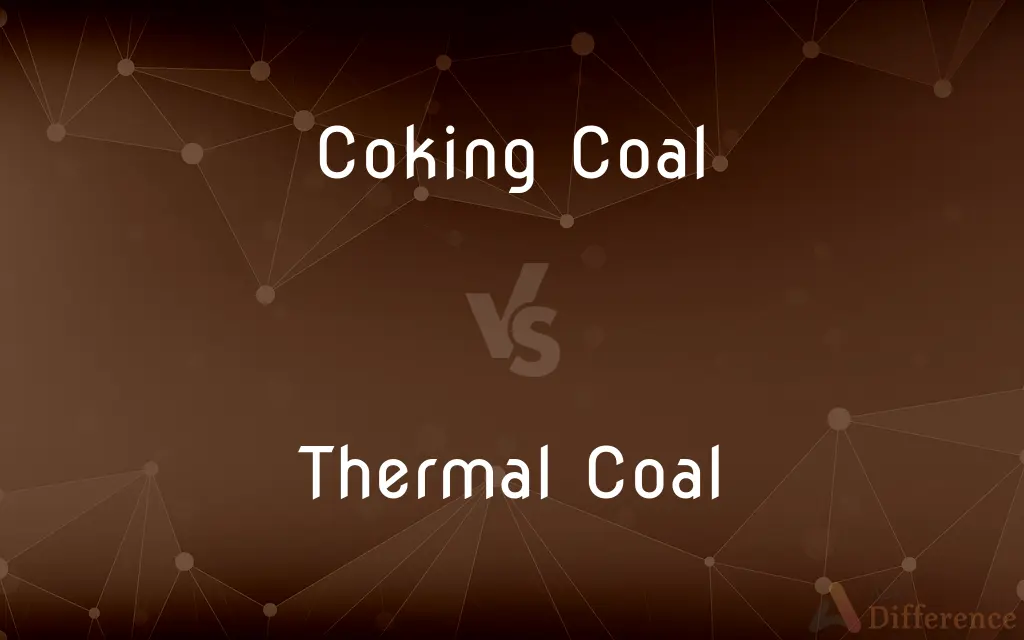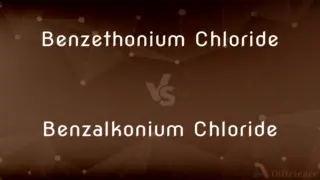Coking Coal vs. Thermal Coal — What's the Difference?
By Tayyaba Rehman — Published on November 3, 2023
Coking coal is used for steel production in metallurgical processes, while thermal coal is used for energy and electricity generation.

Difference Between Coking Coal and Thermal Coal
Table of Contents
ADVERTISEMENT
Key Differences
Coking coal, also known as metallurgical coal, plays an essential role in steel production. Through the process of coking, this type of coal is transformed into coke, a substance laden with carbon that acts as a reducing agent in blast furnaces. Thermal coal, on the other hand, is primarily utilized for power and heat generation. When burned, it produces significant amounts of energy which can be captured and used to produce electricity.
The quality of coking coal is determined by its properties, which must meet certain criteria to effectively produce coke. Key properties include fluidity, volatility, and plasticity. Thermal coal, contrastingly, is valued for its energy content and is less concerned with specific metallurgical properties. Its primary measure is its calorific value, or the amount of energy produced when burned.
While both coking coal and thermal coal are extracted from the ground and may come from similar regions, their end uses are quite distinct. The former is a critical component in the global steel industry, ensuring the production of various steel products. Meanwhile, thermal coal serves as a primary energy source, fueling power plants and thus providing electricity to industries and homes.
In environmental discussions, the two coals are often addressed differently. Coking coal, due to its specific use in steelmaking, has fewer readily available alternatives. Thermal coal, however, faces competition from renewable energy sources and cleaner energy technologies, given concerns over greenhouse gas emissions and global warming.
Comparison Chart
Primary Use
Steel production (metallurgical processes).
Energy and electricity generation.
ADVERTISEMENT
Known As
Metallurgical coal.
Steam coal.
Quality Determination
Fluidity, volatility, and plasticity.
Calorific value (energy content).
End Product
Coke.
Electricity and heat.
Environmental Concerns
Fewer alternative sources.
Competition from renewable energy.
Compare with Definitions
Coking Coal
Coal that, when heated, produces a hard, porous material called coke.
The transformation of coking coal into coke is vital for blast furnaces.
Thermal Coal
Burns to produce significant amounts of energy.
The calorific value determines the quality of thermal coal.
Coking Coal
A type of coal essential for steelmaking.
The steel industry relies heavily on coking coal.
Thermal Coal
Also known as steam coal.
Power stations often have large reserves of thermal coal.
Coking Coal
Also referred to as metallurgical coal.
Metallurgical plants often have a high demand for coking coal.
Thermal Coal
A coal type used predominantly for energy generation.
Many power plants use thermal coal as their primary fuel.
Coking Coal
Known for specific properties like fluidity and plasticity.
The quality of coking coal is pivotal in producing high-grade coke.
Thermal Coal
Major fuel for electricity production worldwide.
Nations with abundant thermal coal reserves often export it.
Coking Coal
Used mainly in the iron and steel industry.
Without coking coal, steel production would face challenges.
Thermal Coal
Faces environmental scrutiny due to CO2 emissions.
The use of thermal coal is declining in some regions due to environmental concerns.
Common Curiosities
What is the environmental impact of using thermal coal?
Burning thermal coal releases CO2, contributing to global warming and environmental concerns.
Why is coking coal essential for steelmaking?
Coking coal produces coke, a carbon-rich material, vital in the steelmaking process.
What is the main use of coking coal?
Coking coal is primarily used for steel production through metallurgical processes.
Is coking coal the same as metallurgical coal?
Yes, coking coal is often referred to as metallurgical coal.
Can coking coal be used for energy generation?
While possible, coking coal is more valuable for steel production due to its specific properties.
What determines the quality of coking coal?
Properties like fluidity, volatility, and plasticity determine coking coal's quality.
Why is coking coal's fluidity important?
Fluidity impacts how coking coal transforms into coke and its effectiveness in steelmaking.
How does thermal coal differ from coking coal?
Thermal coal is used for energy generation, while coking coal is for steel production.
Is thermal coal also called steam coal?
Yes, thermal coal is often referred to as steam coal.
Are both coking coal and thermal coal found in the same regions?
While they can be found in similar regions, specific mines often specialize in one type due to differences in coal quality.
Are there alternatives to using thermal coal for energy?
Yes, there are alternatives like renewable energy sources, nuclear power, and natural gas.
Is coking coal more expensive than thermal coal?
Typically, due to its specific uses and properties, coking coal tends to be more expensive.
Are there clean technologies to burn thermal coal?
There are cleaner technologies, but they don't eliminate all environmental concerns.
Does burning thermal coal contribute to air pollution?
Yes, burning thermal coal releases pollutants that can contribute to air pollution.
How is the quality of thermal coal measured?
The quality is mainly based on its calorific value, indicating its energy content.
Share Your Discovery

Previous Comparison
Tools vs. Equipment
Next Comparison
Benzethonium Chloride vs. Benzalkonium ChlorideAuthor Spotlight
Written by
Tayyaba RehmanTayyaba Rehman is a distinguished writer, currently serving as a primary contributor to askdifference.com. As a researcher in semantics and etymology, Tayyaba's passion for the complexity of languages and their distinctions has found a perfect home on the platform. Tayyaba delves into the intricacies of language, distinguishing between commonly confused words and phrases, thereby providing clarity for readers worldwide.













































